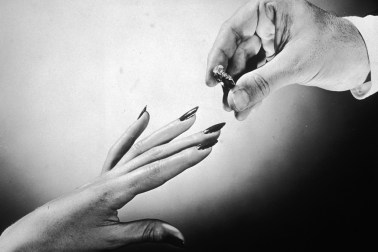Watching the episode of the Simpsons (Sky One, Sunday) written by and starring Ricky Gervais was a bit like going to see a friend in a West End play: so constant is your worry that something might go wrong that you can’t relax enough to enjoy it. But even through all the buttock-clenched well-wishing, you could tell it wasn’t a classic episode.
The problem — as I’ve found myself on those rare occasions when I’ve been paid lots to do an article or it’s a commission from a new editor I’m striving to impress — is that when a writer cares too much about something he almost always messes up. As Gervais well knows, The Simpsons scripts constitute the most clinically brilliant, subtle, wide-ranging, incisive, ingeniously allusive, sophisticated, funny-because-they’re-true writing in TV history, and the moment you start thinking in those terms and try to match it the first thing to go is that slouchy, couldn’t-give-a-toss flippancy which fuels Gervais’s best comedy.
His episode was about a David Brent- style character living in LA who falls in love with Marge during a Wife Swap competition and serenades her with a song whose lyrics go: ‘Lady, when you go away/ I feel I could die/ Not like dye like your hair is dye/ But die like Lady Di.’ The humour is just that teeny bit too overworked, too English-guy-trying-to-please-an-American-audience-with-what-he
-thinks-is-their-idea-of-what’s-funny-about-the-English to hit the spot in the same way that throwaway classics, like, say, ‘I call him Gamblor’ do. But it’s nothing to be ashamed of, Ricky. You’re still a genius.
The thing this week I really wasn’t at all expecting to like was another programme Sky sent me with my Simpsons package — a new drama series called Thief (Sky One, Tuesday). It opened with a gang of thieves in the middle of a high-tech safe-cracking operation (do thieves still actually break into safes, now, except in heist movies?), all of them joshing and bantering in their youthful, zappy, multi-ethnic way and I thought: ‘No. You’re not going to become my friends as easily as that.’
Then it got worse. Their charismatic leader (who, almost inevitably, was black) was shown in his home-life dimension, cuddling his pretty white girlfriend, and having stepfather trouble with her teenage girl. ‘Bugger off!’ I said. ‘I’m not going to be taken in by all this spray-on, character-rounding-by-numbers, ersatz emotional depth.’
But soon after that, the plot kicked in so dramatically I was powerless to resist: the girlfriend gets killed in a car crash leaving the gang leader in charge of a teenage girl who hates him and who shortly afterwards is a witness when, in his own garden, he’s forced to shoot the problem gang member who has developed a dangerous crack habit. Meanwhile, the Korean mob, whose money they nicked, are getting ready to bump them all off. This is the trouble with so much US drama in the wake of 24: it’s so slick and compulsive that if you allow yourself to get sucked in by the first episode, that’s you committed for the whole series.
Channel 5 is getting so great these days we’re nearly at the point where we can forget its incarnation as the channel with the dodgy reception and the air of low-rent, soft-porn shabbiness. Its comedy series Suburban Shootout (C5, Thursday) is, I’m sure, going to win it lots of new fans.
The premise is not unlike The Stepford Wives: in a picturesque, genteel English suburb all is not quite as it seems, something very strange having happened to the women. In this case, they’re not robots programmed to bake perfect cakes and please their husbands in every way (though they do do that, too) but vicious gangsters.
Anna Chancellor is their leader. What started as a civic-minded attempt to curtail local villainy has now degenerated into a vicious protection racket, with librarians being forced to cough up a percentage of the book fines, the local wicker-basket shop being blown up for failing to pay its dues, and so on.
Gary Martin’s and Roger Beckett’s script is well acted by an excellent cast in a reasonably naturalistic way, which lets the absurdities of the situation speak for themselves rather than attempting to point up every joke. I think this will work well for it in the longer term, once you’ve got to know the characters, but in the short term it does run the risk of impatient viewers like my wife going: ‘This isn’t funny. It’s boring.’
I’ll keep on watching if I’m allowed. At the moment, our household is divided on the lines of the show’s two main protagonists: I, like the policeman husband (Ralph Ineson), am rather taken with the idea of this idyllic, bourgeois, free-love community where the hot chicks all carry guns, grate Viagra into their party dishes, and husbands say things like, ‘Come into the jacuzzi, Camilla. You’re next for a spit-roasting’; my wife is the Amelia Bullmore character who finds it all a bit sinister and wants to get out.
I haven’t reviewed Timewatch: Battle For Warsaw (BBC2, Friday) because at the time of writing I haven’t yet watched it: I’m saving it up for my Friday-night treat. But I just want to take this opportunity to say how glad I am to see a proper programme about the second world war on TV. (And I’m not being sarcastic here, by the way.) It seems to me that it has been bloody ages since the last one. Oh please can we have another major 12-part war series narrated by Sam West, oh, please, can we, please?…






Comments